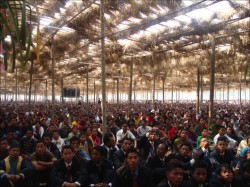The MTEE at the Seventh Asian Lausanne Conference on Evangelism

The Seventh Asian Lausanne Conference on Evangelism took place in Ulaanbaatar, Mongolia from June 1 – 4, 2011. There were two hundred and thirty-eight participants from 18 Asian countries, and more than 60% of them were Christian leaders from Mongolia.
Each morning began with a Bible Study from one of the Asia Lausanne organizing committee, followed by another plenary presentation, and then small group discussion after the coffee break. In the afternoons there were four parallel sessions covering Globalization, Holistic Mission, Business as Mission and Education.
The MTEE was glad of the opportunity to talk about TEE during this Asia-wide forum.
What follows is a brief summary of the four speakers from the Eduaction session:
Our first speaker, Rev. Noel Kotian (Director of Education for the Evangelical Fellowship of India) introduced the goal of Christian education: transformation. Whereas secular education may be content with passing on knowledge, the goal of Christian education must be transformation. This transformation is not only individual transformation, but transformation of families, communities, systems, structures and whole countries. The power for transformation comes throught the Holy Spirit.
Rev. Kotian described a cycle of Christian education from Colossians 1.9-12, and emphasized that worship is at the heart of Christian education.
The second speaker, Rev. Dr. Graham Aylett, consultant with the MTEE, spoke about a powerful tool for Christian

education, Theological Education by Extension, or TEE. The Mongolian churches, like many in Asia, face the challenges of discipling new believers, equipping them for ministry in the home, community, workplace, church and society, and training new leaders. TEE provides a
framework for education in the local church, by the local church, for the local church. It combines opportunities for individual learning (home study using self-study materials), learning together (group discussion led by a trained facilitator) and learning by doing (practical and ministry assignments).

Our third speaker was Rev. Dr. A. K. Lama, the General Secretary of the Council Baptist Churches in North-East India. He talked about the pastoring of pastors. His goal was to equip, encourage and empower pastors in their ministry, to lead them again to the Word of God to find fresh living truth for themselves. The Word of God transforms, motivates and empowers, giving pastors fresh resources for ministry. Dr. Lama described the curriculum for training of new leaders, and emphasized the importance of Word, Spirit and relationships in the family, in the church, and with other denominations. He showed extraordinary pictures of one 2011 state Convention with 70,000 participants.
Dr. Michael Srinivasan, head of the MBA program at ACTS Academy of Higher Education, Bangalore, described the Masters program in NGO management offered by extension. Church ministries serving society may develop into NGOs, and wider ministries serving the churches are often registered as NGOs. However, those leading them may not have the knowledge and skills needed for NGO management. The ACTS program targets this significant need, covering subjects such as: organizational strategy and leadership, ethics in management, human resource management, andfinancial management. The course includes a practical project tailored to the students’ local situation. With twenty people, this program could be offered in Mongolia.
Bangalore, described the Masters program in NGO management offered by extension. Church ministries serving society may develop into NGOs, and wider ministries serving the churches are often registered as NGOs. However, those leading them may not have the knowledge and skills needed for NGO management. The ACTS program targets this significant need, covering subjects such as: organizational strategy and leadership, ethics in management, human resource management, andfinancial management. The course includes a practical project tailored to the students’ local situation. With twenty people, this program could be offered in Mongolia.
